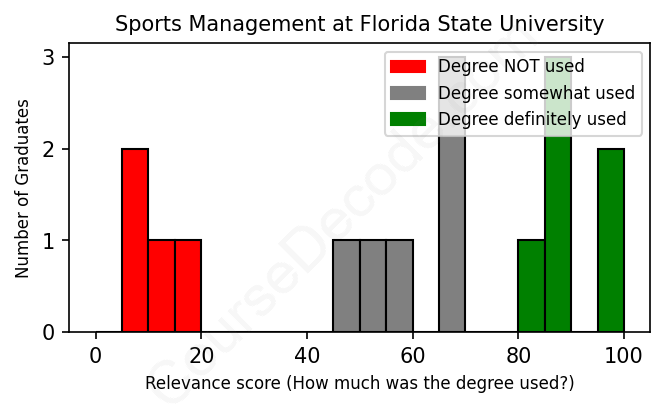
First, some facts. Of the Sports Management graduates from Florida State University we've analyzed , here's how many have used (or NOT used) their degree in their career:

These are estimates based on AI analysis of 16 LinkedIn profiles (see below).
The verdict? Below average. Overall, with an average relevance score of 58%, Sports Management graduates from Florida State University have a lower likelihood (-9%) of finding work in this field compared to the average graduate across all fields:
And for comparison, here's the chart for all profiles we've looked at across all degrees.
Also, after graduating, 68% of these graduates have pursued further education other than another Bachelor's degree (such as a Masters degree or other), compared to the average across all profiles of 35%. This suggests you may need more than just a Bachelors degree to be competitive as a Sports Management graduate.
See the details:
|
Relevance score: 88% We think this person has gone into a career highly relevant to their degree. We think this person has gone into a career highly relevant to their degree.
DEGREE INFOGraduated in 2019 from Florida State University with a Bachelor of Science - BS in Sports Management. No other secondary education since. JOB HISTORY SINCE GRADUATIONSales Associate Carolina Hurricanes Jun 2019 - Jan 2020 Senior Consultant, Service - USF Athletics  Playfly Aspire Jan 2020 - Jul 2022 Team Leader of Service and Retention - USF Athletics  Playfly Aspire Jul 2022 - Present ABOUTNo information provided. |
The top 10 most common jobs done by the graduates we've analyzed (ranked most common to least) are:
Here is a visual representation of the most common words in job titles for Sports Management graduates (this is across all Sports Management graduates we've analyzed, not just those who went to Florida State University):

Graduates from Florida State University's Sports Management program seem to have a pretty diverse set of career paths, with many leaning into sports and marketing roles shortly after graduation. For those fresh out of college, it's common to start in positions like marketing assistants, interns with professional sports teams, or various roles related to sales and customer service in the sports industry. The data shows that many people jump into entry-level marketing or operations jobs with teams or agencies, which is a solid foundation in the sports world.
As time goes on, about five to ten years post-graduation, a lot of these alumni make noticeable advancements in their careers. We see individuals moving into more managerial positions, like marketing coordinator or director roles, especially within sports organizations. Some have even reached leadership roles in athletic departments or in sports marketing firms, which suggests that those initial jobs provide valuable experience and networking opportunities. However, not everyone sticks strictly to sports management careers; some have transitioned into teaching, real estate, or other unrelated fields. Overall, while many graduates find success within relevant sports roles, there’s a fair mix of outcomes based on individual choices and opportunities.
Hey! So, when it comes to a Bachelor's degree in Sports Management at a school like Florida State University, it can be a bit of a mixed bag. Some parts of the program can feel pretty manageable, especially if you’re passionate about sports and enjoy working in teams, but there are definitely challenging moments too, especially when you dive into topics like finance, marketing, and sport law. The workload can fluctuate, and you might find some classes a breeze while others could require some serious late-night study sessions. Overall, it’s not the hardest degree out there, but it definitely has its tougher spots, just like any other major. So, if you love sports and are willing to put in the effort, you’ll likely find your groove!
Most commonly, in the LinkedIn profiles we've looked at, it takes people 4 years to finish a Bachelor degree in Sports Management.
Based on the job paths of these Sports Management graduates from Florida State University, it looks like they've generally done pretty well. The first graduate moved up to a director position in retail services, which often pays well, while others have transitioned into various roles in marketing and athletics that typically offer decent salaries as they progress, like those advancing at the New York Knicks or in university athletics. However, a few still seem to be in entry-level or less lucrative roles, like teaching, which usually doesn't pay as much, especially compared to corporate jobs or higher positions in sports management. Overall, while not every graduate is raking in big bucks, many appear to be building promising careers that could lead to solid incomes down the road.
Here is a visual representation of the most common words seen in the "about" section of LinkedIn profiles who have a Bachelor degree in Sports Management (this is across all Sports Management graduates we've analyzed, not just those who went to Florida State University). This may or may not be useful:

Here are all colleges offering a Bachelor degree in Sports Management (ordered by the average relevance score of their Sports Management graduates, best to worst) where we have analyzed at least 10 of their graduates: